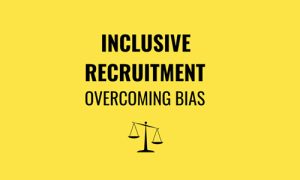Tripod Brixton,
Lambeth Town Hall,
1 Brixton Hill, London,
SW2 1RW
Hours: Monday to Friday, 8am – 7pm
Phone: 020 7580 7333
 As humans and as recruiters, we are filled with countless decision-making moments. When we reply to an email, we decide what to say; when we get a job that needs candidates, we decide how to advertise it; when we review CV’s, we decide who is “good for the job”; when we choose who to call, when we send candidates to our clients…
As humans and as recruiters, we are filled with countless decision-making moments. When we reply to an email, we decide what to say; when we get a job that needs candidates, we decide how to advertise it; when we review CV’s, we decide who is “good for the job”; when we choose who to call, when we send candidates to our clients…
We are so used to making decisions that some of them become unconscious, here is when the different types of bias in recruitment appear. Some of us tend to make quick decisions without taking enough time to value the situation, leading us to be unconsciously biased.
A bias is an inclination or prejudice for or against one person or group, especially in a way considered to be unfair. In recruitment a bias would cause us to make decisions based on the first impression a candidate gives, this could be their profile picture, their CV, their showreel/portfolio of work, their accents, their gender, or their ethnicity.
We can encounter bias in all aspects of the recruitment process, and if we do not identify them and fight against them, we will fail in inclusive hiring.
Here are the types of bias you should watch out for!
Sadly, is very easy to fall into being unconsciously biased. Therefore, it is extremely important to be aware of the types of bias we may encounter and how to avoid them. In order to implement inclusive hiring and diversity, we must work hard to eliminate these bias as they can lead to inaccurate and unfair judgements, and discrimination.
Overcoming unconscious bias can be difficult but it isn’t impossible, some things you can implement in your recruitment process are:
Look at how Yellow Cat started on their DEIB journey:
https://www.yellowcat.london/inclusive-hiring-strategy/
https://www.yellowcat.london/diversity-and-inclusion-strategy/
If you would like to learn more about DEIB and inclusive hiring, you can also check out:
https://balanceandinclusion.com/
https://business.linkedin.com/talent-solutions/diversity-equity-inclusion
https://training.talent.linkedin.com/page/webinars#language_english,topic_diversity
Tripod Brixton,
Lambeth Town Hall,
1 Brixton Hill, London,
SW2 1RW
Hours: Mon to Fri, 8am – 7pm
Phone: 020 7580 7333
Tripod Brixton,
Lambeth Town Hall,
1 Brixton Hill, London,
SW2 1RW
Hours: Monday to Friday, 8am – 7pm
Phone: 020 7580 7333